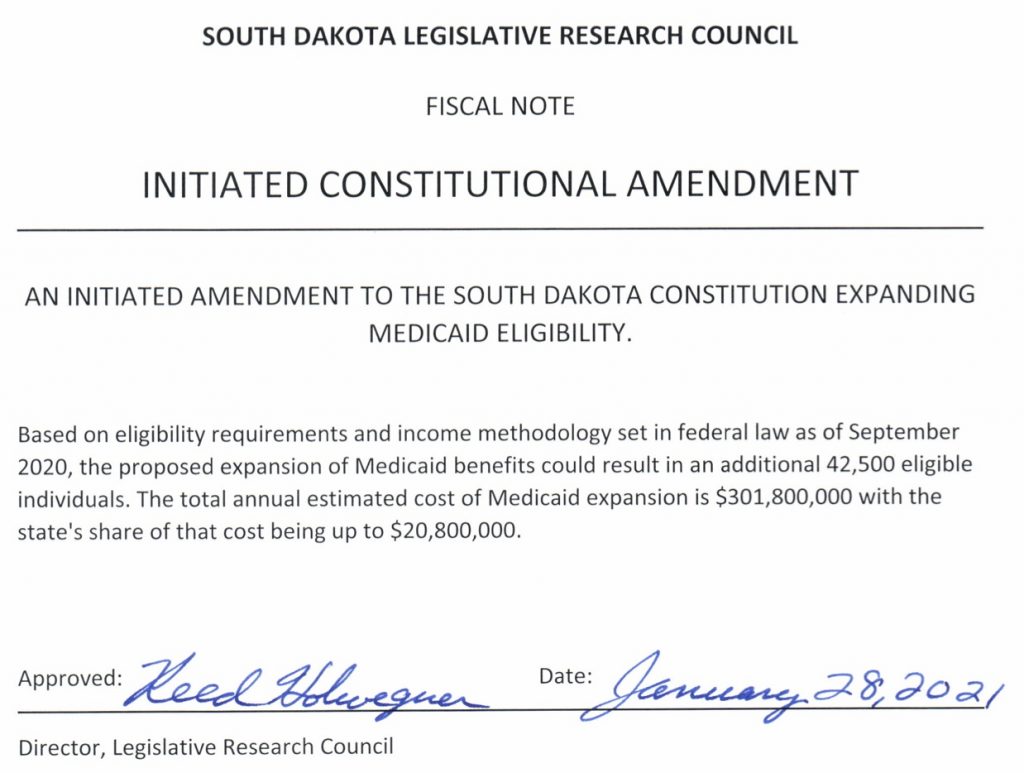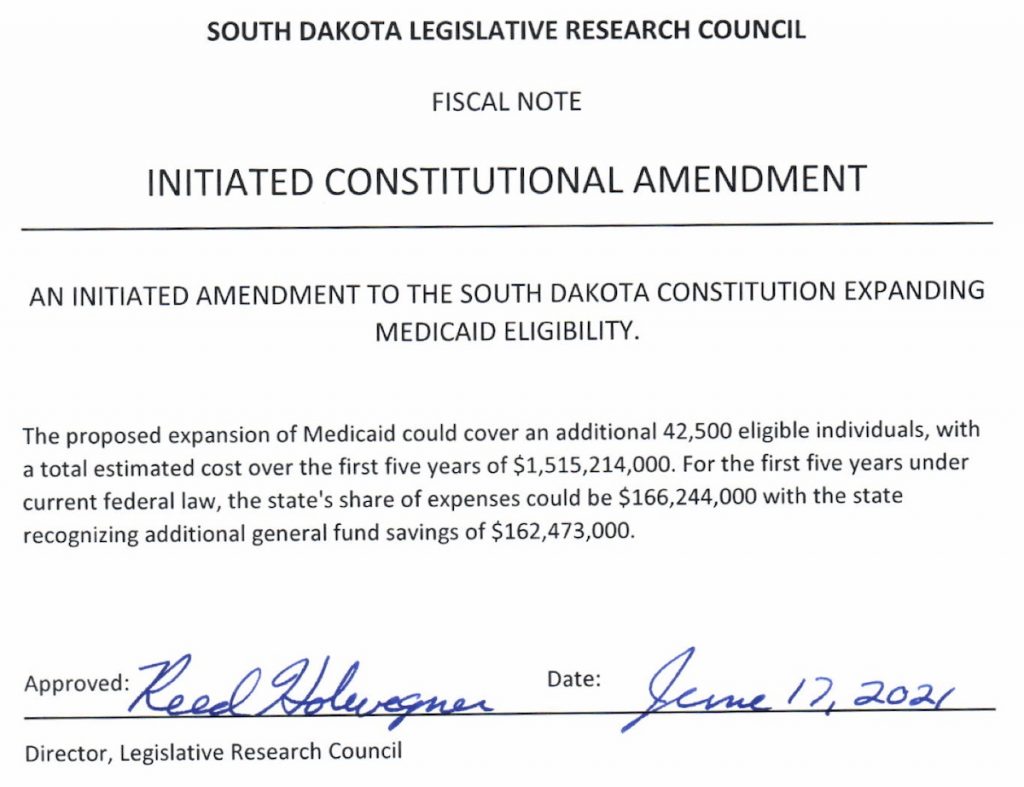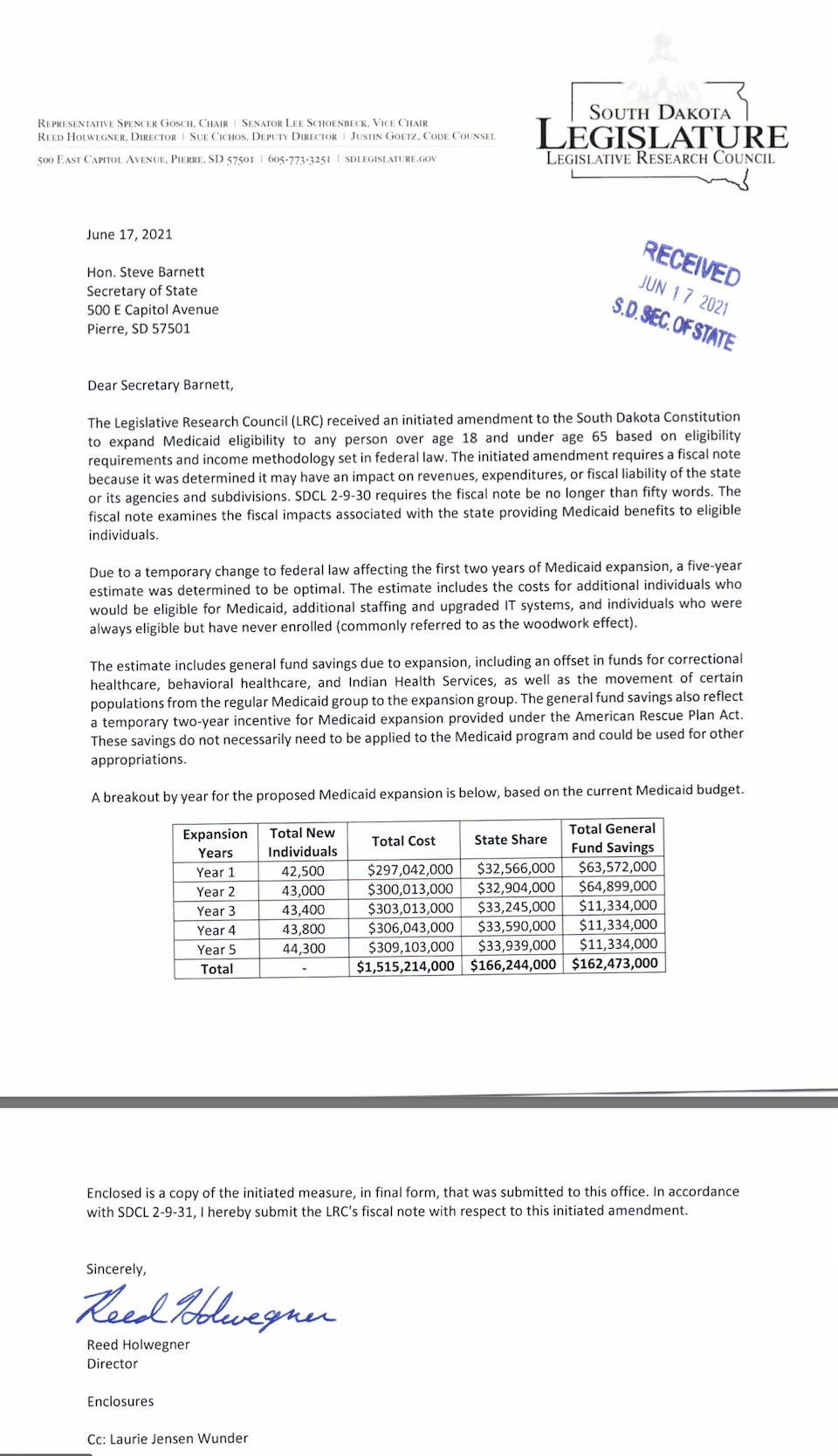Last updated on 2022-03-31
Secretary of State Steve Barnett must have read Dakota Free Press over the weekend and remembered he had that fiscal note for the hospital lobby sitting on his desk. Freshly posted to the Secretary of State’s website is a new fiscal note, dated June 17, 2021, in which the Legislative Research Council surprises me by writing a new fiscal note that differs notably from the analysis it offered for the same measure back in January.
SDCL 2-9-30 requires the Legislative Research Council to issue a fiscal note, no longer than 50 words, for any initiated amendment or measure that may affect the state budget. The LRC did just that for the first Medicaid expansion measure to cross its desk last September, the amendment sponsored by Dakotans for Health. The LRC issued exactly the same fiscal note with exactly the same explanatory letter four months later in response to a copycat initiative amendment prepared by the hospital lobby, now campaigning as South Dakotans Decide Healthcare. Here is that January fiscal note:

42,500 new enrollees, annual cost $301.8 million, state share $20.8 million—exactly the same fiscal impact for both proposed amendments from Dakotans for Health and South Dakotans Decide Healthcare. That’s about all the LRC can do in the 50 words that have to appear on the ballot next to either measure. The LRC could have chosen to report figures from deeper calculations of estimated savings on uncompensated care and increased tax revenue from the jobs and economic activity created by the stimulatory effect of Uncle Sam’s pumping another $281 million into South Dakota’s economy, but the LRC chose to stick to the the plain budget facts of the measure as written.
The hospital lobby then resubmitted its initiative in April. South Dakotans Decide Healthcare did not change one word of its initiative; their second initiative would implement exactly the same policy as their first initiative and exactly the same policy as Dakotans for Health, which has been on the streets collecting signatures on its petition since December.
Yet the LRC last week issued a dramatically different fiscal note:

The LRC still foresees Medicaid expansion providing 42,500 more South Dakotans with health coverage (and for whatever nitpicking ensues, let’s all remember that that expanded coverage is awesome and we should all vote for it!). But the LRC does entirely different money math. Instead of projecting an annual cost of $301.8 million, the LRC decides to give a five-year projection of $1.515 billion. If anyone wants to divide, the LRC is now saying Medicaid expansion will cost about $1.24 million more a year than it said the policy would cost last September and last January.
LRC also now projects the state’s share of Medicaid expansion costs will be $166,244,000 over five years, or an average of $33.2 million a year. Were that figure to appear on the ballot with the hospital lobby’s amendment side by side with the Dakotans for Health amendment and its original September 2020 fiscal note, attentive voters would notice LRC is saying that the “new” Medicaid expansion amendment (SDDH’s resubmitted language) will require the state to appropriate $12.4 million more per year than the original Medicaid expansion amendment (D4H’s original amendment)… which practically implements the same policy as the “new” amendment.
Perhaps helpfully, the LRC decides to scratch out some introductory filler from its original fiscal note to make room for some kind words to support the amendment, pointing out that the state will realize general fund savings of $162,473,000 over five years. That’s great…but that’s what Medicaid expansion supporters have been saying all along and what Medicaid expansion states have experienced. Why didn’t LRC recognize those fiscal savings the first two times it reviewed this same policy?
The LRC can’t explain its change of mind in 50 words on the ballot… so, helpfully but remarkably, the LRC placed on its official letterhead an official explanation of its new methodology… though the LRC avoids mentioning that it has changed methodology from the first time it reviewed this proposal:

The letter does what the LRC cannot in its 50-word statutory limit. It tells us the broader perspective the LRC is taking. It tells us the policy change motivating their revision, the passage of the American Rescue Plan. It even tells us we’ll help more people each year with Medicaid expansion: the first data column of the table shows that in five years we’ll be helping 44,300 people get health care. But the table also shows that the costs rise each year, total and state share, while the savings drop and stagnate after Year 2.
All this extra explanation is well beyond the LRC’s simple statutory mandate to produce a fiscal note of 50 words or less. Statute doesn’t say LRC can’t explain its fiscal notes, but statute doesn’t authorize or recommend such additional LRC scale-thumbing on ballot measures.
Now let me be clear: I don’t think either this letter or the new fiscal note in themselves are bad things. In these documents, the LRC engages in the fuller policy analysis we should expect to inform the debate over any public policy. To make informed decisions, legislators—both the elected kind who go to the clubhouse in Pierre and the original kind, all of us, voting as citizens who captain our own destiny via our Father-Haire-given right to direct democracy—should look not simply at the narrow ledger line that shows how much the state will appropriate for a policy; we should look at the changes and consequences of the policy in the real world. The LRC acknowledges that the passage of the American Rescue Plan last winter has changed the fiscal impact of Medicaid expansion by offering South Dakota even more federal dollars that will stimulate South Dakota’s economy and boost our GDP and state revenues while saving lives. The LRC has rightly determined that these new conditions warrant a new fiscal note.
The problem is that the LRC refused to adopt this more comprehensive view of Medicaid expansion last September and last January, when it ignored all of the obvious fiscal consequences beyond the initial budget that are attested by the empirical data from the 39 states+DC that have already expanded Medicaid. Because of this refusal, the LRC is now saying, in its two fiscal notes, two very different things about identical policies, the D4H amendment and the SDDH amendment. The LRC is essentially saying that the original fiscal note is now obsolete and incorrect; it gives voters inaccurate and incomplete information about Medicaid expansion.
That’s not Dakotans for Health’s fault; they’re just following the law and handing to voters the fiscal note the LRC wrote for them. Their policy and their petition remain valid, but the old fiscal note the LRC and the Legislature force them to carry is misleading the voters. When we regular folks mislead the voters, that’s a Class 2 misdemeanor:
Any person knowingly printing, publishing, or delivering to any voter of this state a document containing any purported constitutional amendment, question, law, or measure to be submitted to the voters at any election, in which such constitutional amendment, question, law, or measure is misstated, erroneously printed, or by which false or misleading information is given to the voters, is guilty of a Class 2 misdemeanor [South Dakota Codified Law 12-13-16].
The LRC’s new fiscal note on Medicaid expansion renders its previous fiscal note false. The old fiscal note mandated by the state misleads voters by making them think D4H’s Medicaid expansion plan is substantively different from SDDH’s plan. The LRC has seen fit to rewrite the fiscal note for one Medicaid expansion petition; it has an obligation to revise the fiscal note it has attached to the substantively identical Medicaid expansion petition that is already circulating, without any penalty to the circulators who have followed the letter of the law in circulating that existing petition with the required fiscal note that the LRC has now declared obsolete.
The LRC should immediately give Dakotans for Health a new fiscal note. The LRC should write D4H a letter explaining their revised methodology just like they did for the dilly-dallying South Dakotans Decide Healthcare (even though statute does not require the LRC to produce such a nice explanation with its fiscal note). And the LRC should issue an apology to D4H, its petitioners, and the public for failing to correct its fiscal note sooner and avoid misinforming the voters. For good measure, the Legislature should give itself 40 lashes with a wet noodle for creating this fiscal note requirement in the first place; instead of tying an initiative to an explanation written more than two years before the measure goes to the voters and forcing campaigners to circulate government speech, the Legislature should leave responsibility for explaining ballot measures to the advocates and opponents.
Voters should care about getting accurate information about ballot measures from the LRC, but I suspect very few voters will care about the LRC’s new revision and the resulting conflicting fiscal notes. Very few people are going to look at the D4H petition and the SDDH petition side by side and make a signing decision based on the LRC’s differing numbers. 95% of voters are going to hear two words—Medicaid expansion—and either sign the petitions because they know Medicaid expansion is moral and effective or not sign because Medicaid expansion is Obamacare and socialism and we gotta Stop the Steal™! The same will be true of voters seeing both measures on the ballot. Among the remaining 5%, most will skim the fiscal notes, see million in the D4H note and billion in the SDDH note and think (assuming they aren’t put off by the prospect of the least smidgeon of new government spending), “Well, golly! the D4H plan is cheaper! It’s got my vote!”
Deriving any advantage from this all-new fiscal note requires attention to methodology and arithmetic, and those aren’t the key ingredients to the kind of PR slam dunk South Dakotans Decide Healthcare were looking for. They’d have been better off just circulating their darned petition since March 25 and collecting thousands of signatures.
But we have our new fiscal note. It applies with equal accuracy to both Medicaid petitions. It makes the two main points that every advocate of Medicaid expansion has been saying for years: expanding Medicaid in South Dakota will help tens of thousands of our neighbors get health care, and we’ll come out no worse for budgetary wear. The main message remains the same: save money, save lives, sign the petitions, and expand Medicaid!
I recall some Conservatives with Common Sense, not all that long ago, advocating muchly the same thing. Do you recall that, Mr. H?
You forgot the rest of Shakespeare’s title, “…About Nothing.” We can giggle about what the Elizabethans meant about “nothing,” but what I mean about “nothing” is complete void, otherwise known as fiscal notes.
Technically, fiscal notes are words and numbers that encapsulate nothing. Their value is 0, nada, zilch. Idiots won’t delve one word into those fiscal notes, and even bigger idiots will search the words for the words of God. Fiscal notes attached to initiative petitions are forced speech, so they are worse than nothing, in my opinion. But you came, at the end, to the right conclusion: “They’d have been better off just circulating their darned petition since March 25 and collecting thousands of signatures.” Signatures are “Much Ado About A Big Effing Deal.” It’s real life and death for a lot of people.
T.L.T.R.E(entirely)
In the same way immigrants enrich and enliven a society, helping low income people similarly helps wealthy people.
The wealthy, white males that control what happens in South Dakota need to be selfish, in a more overt way.
Why do Republicans oppose expansion of Medicaid, really? It most likely comes down to the small government mind thing they have. Otherwise its just that they like killing poor people. Of course thats not true, but its what they do, in reality. It really comes down to a matter of rights, and according to Republicans nobody is entitled to healthcare, period. So what does a Republican think their rights are? A right to vote, no that ones gone. Free Speech, well they like that as long as it includes lying like a rug. Own a gun, you betcha. Any size shape or caliber the bore not the character. Religion, as long as it discriminates. Really what do they believe in other than trumps whims?